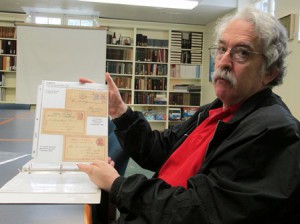By Michael Gelbwasser, Contributing Writer

Marlborough – In this era of email and text messages, Marlborough resident Jeff Shapiro jokes that he and his peers “get to read dead people’s mail.”
Shapiro has collected envelopes – studying “the rates and routes and history of that letter” – for decades. He estimates he has about 5,000 of these envelopes, called “covers,” at his Marlborough home.
“There’s letters in there. Lots of talking about world events,” Shapiro said. “I remember one of the first postal history items I got was when I was in high school. It talked about Lincoln’s funeral train passing through Cleveland. I’m getting letters from concentration camps or soldiers, just talking about what life was like day to day on the battlefield or in the camps.”
Shapiro said he also is a nationally accredited judge of stamp shows, and chairs a national show held yearly in Boxborough. The show attracts 75 dealers, he said.
“That’s where people bring in their multi-million-dollar exhibits and people like me go and judge them,” said Shapiro, adding that he also recently judged shows in Houston and Indianapolis.
Shapiro’s hobby grew out of his stamp collection, which the retired human services management professional started as an 11-year-old in Cleveland, shortly after his father, Jack, died suddenly.
“They really didn’t know what to do with me, a guy without a father,” Shapiro said. “My mother was talking to her friends, [who] said, ‘Why don’t you get him a stamp album?’ This was a different time, where kids collected stamps. There were no computer games. She got me a small album and a packet of [U.S.] stamps, and I was off. I immediately took to the hobby.”
Even at 11, he recalled, he was very interested in history.
“I was getting old stamps, [from] countries that no longer existed, and they were plentiful. There were places near where I lived where you could buy bags of used stamps for under a penny a piece,” he said.
Shapiro said stamp collecting broadened his knowledge of history, economics and geography.
“I really think it helped me get into a better school, because I was way ahead of my classmates in junior high and even high school, and got into some advanced placement classes in history and economics because of the stamps,” Shapiro noted.
He minored in geography at Boston University “just because of the love of my stamps.”
Over the years, Shapiro said, he shifted his hobby from stamp collecting to postal history.
“We not only look at the stamps, we look at the markings, the address, how it got there, the rates that were charged,” he said.
World War II is his latest interest.
“Because of the war, rates changed and routes changed and countries weren’t accepting mail because of the war,” Shapiro explained. “Some letters were being confiscated. A lot of letters that normally would have been private were now being censored.”
Shapiro said he finds his material on eBay, which offers “hundreds of thousands of stamps and covers that I can pick and choose from,” and from dealers.
Also, shows for stamps and covers are usually held every Sunday, he said.
Shapiro said he also speaks to local stamp clubs. He’s a member of the Northeast Federation of Stamp Clubs, which has about 40 clubs throughout New England.
He mentioned that, despite electronic distractions, he is “seeing more and more kids coming back to stamps,” particularly among children ages 8 to 10, who are drawn in through collecting stamps of specific topics, such as sports.
Shapiro noted that during the 1950s and ‘60s, stamp collecting was known as “the hobby of kings.”
“FDR collected stamps. The kings of England collected stamps. So there was a certain prestige with stamp collecting,” he said. “Kids today have forgotten the prestige of stamp collecting. Because it’s more than just little pieces of paper.”











